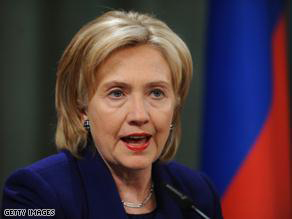The United States and Pakistan sought on Wednesday to reverse years of mistrust, predicting a bumpy path to counter anti-American sentiment amid tensions on issues from nuclear cooperation to security, Reuters reported.
"It is the start of something new," U.S. Secretary of State Hillary Clinton said at the beginning of two days of meetings with its nuclear-armed ally.
But she added: "Our countries have had our misunderstandings and disagreements in the past, and there are sure to be more disagreements in the future."
Pakistan is an important U.S. ally in the battle against al Qaeda and the Taliban, particularly as Washington sends more troops to neighboring Afghanistan to fight a war weighing heavily on President Barack Obama's political legacy.
"Such a partnership, we are convinced, is good for Pakistan, good for America and good for international peace, security and prosperity," Pakistan's Foreign Minister Shah Mehmood Qureshi said in his opening remarks.
"Now is the time to look forward," he added.
The "strategic dialogue" between the nuclear-armed allies is likely to produce several signed agreements, from building dams and roads to power projects for energy-starved Pakistan, as well as additional security commitments.
In public, both sides sought to show a united front with the delegations intermingled rather than seated on opposite sides for the official meetings as is often the case.
However, behind closed doors both planned to raise a host of tough issues. The United States wants Pakistan to sustain
NUCLEAR TENSIONS
There are also tensions over how far the United States is prepared to go in its pledge for a closer relationship, with Pakistan pushing for a similar civilian nuclear cooperation deal with Washington that its arch-rival India has.
"We hope nondiscriminatory access to vital energy resources will be available to us so that we can pursue our economic and industrial development plans," said Qureshi in his opening statement, a reference to nuclear energy capability that Pakistan wants to boost to resolve its power crisis.
Pakistan's delegation sent a 56-page document to the Americans ahead of this week's meetings, giving their view of future relations and asking for more helicopters and pilotless drones as well as civilian nuclear cooperation.
"What is good for India, should be good for Pakistan," said Salman Bashir, Pakistan's foreign secretary.
The United States, however, is reticent over any nuclear deal with Pakistan, which took years to negotiate with India and requires consensus approval from both the 46-nation Nuclear Suppliers Group as well as the U.S. Congress.
Washington is also cautious due to an uproar created by allegations that a disgraced Pakistani scientist, Abdul Qadeer Khan, transferred nuclear secrets to Iraq and Iran.
SECURITY FOCUS
Pakistan's Army chief General Ashfaq Parvez Kayani is also a key player in the meetings and was sandwiched between the head of the joint chiefs of staff, Admiral Mike Mullen and Defense Secretary Robert Gates for the State Department talks.
Clinton repeated U.S. praise of Pakistan's military actions, especially the arrest of a key Afghan Taliban commander in a joint U.S.-Pakistani raid in Karachi earlier this year.
She said thousands of Pakistanis had lost their lives to extremist attacks and the United States was fully behind its ally in the struggle to fight militants.
"To the people and government of Pakistan, the United States pledges its full support," she said, acknowledging strong anti-American sentiment the Obama administration is struggling to turn around.
In its 56-page wish list sent to Washington, Islamabad repeated a demand for the kind of "shoot-to-kill" pilotless drones being used by the United States to target militants as well as other security and economic assistance.
Last year, the U.S. Congress passed legislation for a $7.5 billion aid package for Pakistan over the next five years, and Islamabad is looking for more specifics on projects and timetables over when the money will arrive.
Qureshi repeated a Pakistani demand for increased trade and market access to the United States. "Economic opportunities in Pakistan can fight extremism," he said.






